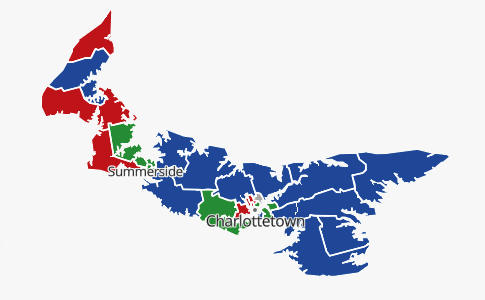In the Prince Edward Island election last week, the voters threw out the incumbent Liberal government and instead opted for a minority Progressive Conservative replacement. One of the bigger surprises of the outcome was that the Green Party surged into the second-largest number of seats, to be the Official Opposition for the first time. Colby Cosh explains that the Greens ran on a more typically NDP platform that only vaguely gestured toward any traditional Green policies:

Election results map for the April 23, 2019 provincial election.
Blue – PC Red – Liberal Green – Green Party Orange – NDP (no seats won)
Map via CBC News – https://newsinteractives.cbc.ca/elections/pei/2019/results/
Breakthrough or letdown? The Green Party of Prince Edward Island won the second highest number of seats in the province’s election Tuesday, and leader Peter Bevan-Baker seems likely to become opposition chief facing a Conservative minority government. The P.E.I. Greens have been big news for a while now, doubly so because the Island has always stuck to the classic two parties, and in the run-up to the vote, polls had suggested that Bevan-Baker might end up as premier. This didn’t happen — or hasn’t yet! — and in the overall popular vote the Greens ended up beating the third-place incumbent Liberals by only a little over one percentage point.
In truth the P.E.I. Greens seem to be in a good position going forward, if we agree to overlook the general history of Green floundering in Canada. Bevan-Baker, a Scots dentist, has lost more elections than you’ve had hot meals, but his soft-spokenness and graciousness seem to have struck a belated chord with Islanders. A three-way vote split of 37-31-30 seems like a recipe for instability, even though the parties are issuing familiar gab about legislating in a co-operative, collegial way.
Everybody knows that P.E.I. is both an unusual place, with some of the features of an extended family, and a small place. What has worked for Bevan-Baker’s Greens might not scale up well to a much larger entity, such as Regina, Sask. This has not stopped commentators from speculating on the election being the possible starting gun for nationwide Green success. The idea is that Canadians, particularly the young, have finally taken the environmentalist message (whatever that is) into their hearts and are ready to defect from tedious mainstream neoliberal politics. The revolution is at hand! Any minute now!
If you followed the P.E.I. campaign at all, you know that there’s a major problem with this concept. It’s that the Green platform wasn’t especially, uh, green. Everybody who was actually on the Island political beat noticed this. The formal pitch included minor nods toward electric vehicles and solar power, of a kind you wouldn’t even be surprised to find in a Conservative election document nowadays, but Bevan-Baker himself emphasized the “pragmatic” nature and careful costing of the party’s platform. Almost as if he was conscious of having to overcome an inherited Green reputation for flakiness.
 A quick recap of the first two days of the draft: in the first round, the Vikings addressed the single biggest need by drafting North Carolina State centre Garrett Bradbury with the eighteenth pick. In the second round, the team selected Alabama tight end Irv Smith, Jr. The third round was where things went quickly into horse-trading nirvana for Vikings general manager “Trader Rick” Spielman, with four consecutive trades executed to amass nine draft picks for the remaining rounds. At the end of that flurry of trades, the team selected Boise State running back Alexander Mattison.
A quick recap of the first two days of the draft: in the first round, the Vikings addressed the single biggest need by drafting North Carolina State centre Garrett Bradbury with the eighteenth pick. In the second round, the team selected Alabama tight end Irv Smith, Jr. The third round was where things went quickly into horse-trading nirvana for Vikings general manager “Trader Rick” Spielman, with four consecutive trades executed to amass nine draft picks for the remaining rounds. At the end of that flurry of trades, the team selected Boise State running back Alexander Mattison.



